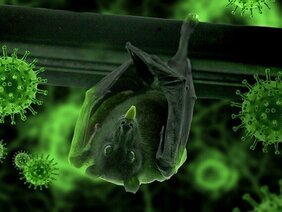Scientists warned that although the chance of the coronavirus jumping from humans to North American bats is low, it could further threaten bat species already struggling with the fungal disease white-nose syndrome. Furthermore, the virus could then potentially spread through bat populations across the country and potentially cause a “spill-back of SARS-CoV-2 from bats back into humans … which would make eradication of SARS-CoV-2 unlikely,” warned USFWS Wildlife Veterinarian Samantha Gibbs.
“We know that many mammals are susceptible to infection by a diversity of coronaviruses,” said a USFWS spokesperson. “What is not known is whether the novel coronavirus SARS-CoV-2 has the potential to infect, or cause illness in, North American wildlife, including bats.”
A group of biologists and other experts from government agencies, wildlife organizations, and research groups met last week to “quickly assess the risk SARS-CoV-2 may pose to bat populations,” added the spokesperson. The group is expected to issue updated recommendations on interactions with bats later in April, according to a notice published by the National Wildlife Health Center of the U.S. Geological Survey.
This advisory is a cause for concern for some bat researchers. According to Winifred Frick, chief scientist for Bat Conservation International, this is a problematic time to suspend bat research as late winter and early spring are important seasons for white-nose syndrome research. The directive could also stall coronavirus research in bats and cause significant research delays for graduate students. “I have a big bat project that involves a lot of handling of bats, but my projects aren’t super time-sensitive, and missing a year won’t destroy the project,” said Bryan Hamilton, a National Park Service biologist. “But graduate students need their three years of data, and that could set them back a year or more.”
(AIBS)





